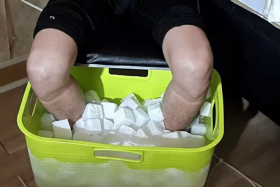Elizabeth Holmes sentenced to more than 11 years in prison for Theranos fraud
SAN JOSE - A California judge sentenced Theranos founder Elizabeth Holmes to 11 years and three months in prison for defrauding investors in her now-defunct blood testing startup that was once valued at US$9 billion (S$12.38 billion).
US District Judge Edward Davila in San Jose sentenced Holmes on three counts of investor fraud and one count of conspiracy. A jury convicted Holmes, 38, in January following a trial that spanned three months.
The judge set Holmes’ surrender date for April. Her lawyers were expected to ask the judge to allow her to remain free on bail during her appeal.
Assistant US Attorney Jeff Schenk told the judge before he handed down the sentence that a 15-year sentence would be “making a statement that the ends don’t justify the means”.
But Holmes’ attorney Kevin Downey urged leniency for Holmes at the hearing, saying that unlike someone who committed a “great crime” she was not motivated by greed.
Holmes had asked in court papers for a more lenient sentence of 18 months of home confinement, followed by community service, urging the judge not to make her a “martyr to public passion”.
Prosecutors said Holmes misrepresented Theranos’ technology and finances, including by claiming that its miniaturized blood testing machine was able to run an array of tests from a few drops of blood. The company secretly relied on conventional machines from other companies to run patients’ tests, prosecutors said.
Ahead of her sentencing, prosecutors had said a 15-year sentence was necessary to deter Holmes and others from fraud.
Her crimes “damaged the trust and integrity” on which Silicon Valley’s startup economy relies, they said.
The federal probation office had recommended a 9-year prison sentence, according to court papers.
Theranos promised to revolutionize how patients receive diagnoses by replacing traditional labs with small machines envisioned for use in homes, drugstores and even on the battlefield.
Forbes dubbed Holmes the world’s youngest female self-made billionaire in 2014, when she was 30 and her stake in Theranos was worth US$4.5 billion.
But the startup collapsed after a series of articles in the Wall Street Journal in 2015 questioned its technology.
At the trial, prosecutors said Holmes engaged in fraud by lying to investors about Theranos’ technology and finances rather than allowing the company to fail.
Holmes testified in her own defense, saying she believed her statements were accurate at the time.
Though she was convicted on four counts, Holmes was acquitted on four other counts alleging she defrauded patients who paid for Theranos tests.
The judge denied Holmes’ requests to overturn her convictions, saying they were supported by the evidence.
Now that the sentence has been imposed, Holmes can challenge those rulings and her sentence at the 9th US Circuit Court of Appeals. - REUTERS
Get The New Paper on your phone with the free TNP app. Download from the Apple App Store or Google Play Store now

